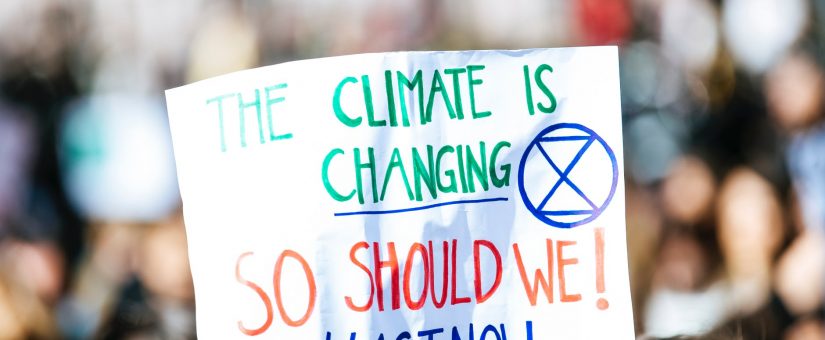"Climate Change", one of the great global environmental risks.
Today, our world is changing faster than we could have imagined. With social and economic disruption on a scale rarely seen since the end of World War II 75 years ago, the COVID-19 pandemic is forcing us to completely rethink the notion of “common business.”
As some countries begin to emerge from the first acute phase of the pandemic, the COVID-19 crisis is substantially changing people’s thinking. Human health and healthcare in general have rightly become the top priority of world leaders. COVID-19 is making it painfully clear how interconnected our social, economic and environmental challenges are.
There is a global consensus on the seriousness of climate change.
The World Economic Forum emphasizes this in its latest Global Risks Report. Global Risks Report . For the first time, it shows how the top five global risks in terms of probability are all related to the environment.
This year the top five risks are all environmental
While many other studies have focused on the enormous impact that climate change is having on people. Thanks to this, the general understanding that climate and our health are deeply, and directly connected. So both issues require our serious attention and action.
For example, research at Harvard University Harvard University indicate that people living in more polluted regions are being more severely affected by the coronavirus than others, while another study – published in the medical journal The Lancet – predicts that 500,000 adults will die as a result of climate change by 2050. As Mark Carney, former governor of the Bank of England, recently said, “We cannot insulate ourselves from climate change.”
As we can see, this COVID-19 crisis is highlighting that:
- we live in an interconnected world, where borders are no longer physical walls.
- to recognize the immediate need to better prepare people, but also our planet, for the interrelated risks of healthcare and climate change.
- that a large-scale, comprehensive response to a global crisis is possible when we all commit to it.
Let’s drive ACTION
All of us-governments, industries, global companies, citizens-must address the issue of sustainability with urgency, but the substantial change brought about by the COVID-19 crisis is laying the groundwork for the radical changes that are required as we try to rebuild our economies.
According to the World Economic Forum, what happens in the coming months could go in one of two directions.
- There is a risk that as the immediate crisis subsides and its economic consequences become clearer, we will set aside long-term aspirations in favor of easy short-term solutions.
Climate – as well as the circular economy – may well become less of a priority for stakeholders, customers and the industry as a whole as they focus on reviving the economy quickly.
An example of this is the case where the temporary drop in CO2 emissions during the last global financial crisis in 2008 was short-lived. It is now estimated that CO2 emissions in Spain will fall by more than 10% in 2020 due to Covid-19. Between January 1 and May 1, GHG emissions decreased by 18.31%. This is the largest decline in history since the Civil War, due to pandemic and confinement, but it is feared that emissions will increase again when this crisis is over. As we can see COVID-19 is reducing air pollution, but it will not slow down climate change.
2. Important milestones already reached in the climate negotiations may well be delayed.
An example of this is the Spanish Circular Economy Strategy, Spain Circular 2030. Which aligns with the objectives of the European Union’s two circular economy action plans, 2015’s “Closing the loop: an EU action plan for the circular economy”, and 2020’s “A new Circular Economy Action Plan for a cleaner and more competitive Europe”. In addition to the European Green Pact and the 2030 Agenda for Sustainable Development. In the event of an economic downturn, funds set aside for sustainability investments are likely to be diverted to other projects.
What should be our course of action?
The current crisis offers us an opportunity to tackle the issue head-on now, although scientists warn that we still have 10 years to avoid the worst consequences of climate change. The pandemic is showing us that we have the technology, the scientific understanding, the financial means and the human resources to deal with climate change. This may be our only chance to “rebuild” and work on an economy that takes care of people and takes into account the limitations of our world. With so many tools at our disposal to make progress on climate change, what we need first and foremost is leadership and the political will to implement them. NOW IS THE TIME!
Develop and support sustainable measures
At a time when governments are agreeing economic stimulus packages to help people and organizations survive the likely recession, it is our job – as global business and industry – to ensure that sustainability and climate action are integrated into our strategies. We need to step up and work together to achieve this, as we are currently doing in our fight against COVID-19. Together, we can ensure that these key issues remain high on the agenda of national and international institutions, along with accessible healthcare.
For example, European Union bidding rules have been adapted to include the total cost of ownership, but this is not yet widely understood or applied by national or regional governments, let alone municipalities. They continue to make their purchases based on the lowest initial cost, regardless of the environmental impact.
We need to collaborate and make sustainability a key requirement of tenders, this will support the economy and the environment at the same time. Other examples of green stimulus could be a European alignment in chemicals, products and waste legislation to increase recycling and the development of “green products”, and the promotion of circular ownership models to consumers.
The need to collaborate is widely recognized and was also highlighted in a recent Oxford survey of financial and economic experts from G20 countries, which emphasized that the potential for climate impact is one of the most important issues for the G20. the most important dimensions of the tax recovery packages. At the same time, other research clearly shows that countries with an active long-term strategy to approach global warming targets will be better off economically and financially than others.
This has also been highlighted by Frans Timmermans, executive vice-president of the European Commission, who was recently quoted as saying: “We need to invest in a new economy to come out of this crisis in better shape than how we entered it; ready for the future, sustainable, inclusive, competitive and well prepared […] because it is more profitable to protect the environment than to destroy it”. This could be our best chance to do so.”
And in this line, Spain is already working on how to “flatten the curve” of environmental destruction, among the proposals are the already announced Climate Change and Energy Transition Law, the Circular Economy Strategy and the draft bill on waste, which vetoes single-use plastics. A Sustainable Mobility Law and a Health and Environment Plan are also proposed.
The Health Plan should consider the importance of protecting nature and the environment, and preserving and recovering ecosystems as a fundamental element of prevention and protection against future pandemics.
From Laragon Sustainability Solutions we have been a benchmark in the digitization of many of these initiatives for more than 15 years, providing companies with our experience in optimizing all company processes towards sustainability, transparency, risk management and good governance.
We want to be part of your team. Together, we can build more resilient and inclusive economies based on the responsible use of resources, and thus be better prepared for the upcoming challenges of this century.



